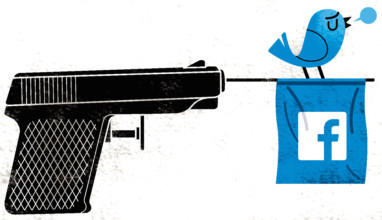
I get sceptical whenever I am invited to participate at yet another forum dedicated to social media. In fact, such forums have become so redundant that anyone can almost predict what the topics, questions and conclusions are going to be.
Since 2011, we have talked about nothing but whether or not the likes of Twitter and Facebook have caused the Arab Spring or not; and whether or not social media will ‘kill’ traditional media (print, television and radio).
More annoyingly, we have seen ‘social media experts’ mushrooming so fast over the past few years, that it almost seemed like everyone suddenly became a reference on how to best utilise social networks and analyse what impact a single tweet or a Facebook post might have.
However, one has to admit that the Arab Social Media Influencers Summit (Asmis) provided something rather different and tackled issues with a fresh, practical approach.
This was particularly true when it came to the session I had the pleasure of moderating with Dr Nicholas Christakis who is — without exaggeration — amongst the world’s most knowledgeable and incredibly insightful experts on the topic of how social networks are affecting our everyday lives.
Dr Christakis is a graduate of both Harvard School of Public Health and Harvard Medical School. He is the co-author of Connected: The Surprising Power of Our Social Networks and How They Shape Our Lives, which has been translated into 20 languages. And currently, he is co-director of the Yale Institute for Network Science. His work is focused on the relationship between social networks and well-being.
As such, the discussion at Asmis was a golden opportunity to set the record straight on what social networks can or cannot do. A natural question to ask was whether or not he (Dr Christakis) believed the Arab Spring was a product of social media?
Thankfully for all of us, Dr Christakis believes social networks are a “vehicle for disseminating information,” not “for changing people’s behaviour” and as such, we can now all rest assured that revolutions cannot occur at a press of a button.
Indeed, I cannot understand why many people cannot simply see that Twitter and Facebook were to the 2011 Arab Spring what brochures and secret meetings in cafes were to the French Revolution; i.e. merely tools to disseminate information and surpass surveillance and censorship.
Of course, these networks had an important role to play, but we simply cannot argue that it was a micro-blogging site — not the feeling of injustice — that pushed Mohammad Bu Azizi to set himself on fire in Tunisia. Similarly, we cannot argue that it was a Facebook page, not the role of the army in Egypt or Nato in Libya, that ended the Hosni Mubarak and the Muammar Gaddafi regimes, respectively.
However, Christakis does suggest that social networks can help develop properties that did not exist within the individuals.
The key to develop these properties lies in who are we connected to. However, when it comes to connections, it is not quantity, but quality that matters.
Indeed, Dr Christakis says people will not simply take to the street, buy a product, or have a preference because a stranger tells them to do so. However, one is likely to be more convinced if the advice comes from someone close to us or someone we trust.
The same applies to habits and moods; in fact, a recent social network-related study, which included 12,000 people aged over 32, found that you are 57 per cent more likely to become obese if you are connected to a friend who became obese. However, the chances go to up to 171 per cent if a close, mutual friend becomes obese.
As such, the core of what Dr Christakis is arguing is that our direct surrounding of close, intimate friends/connections holds the key to influencing our preferences and affecting our moods.
Currently, Dr Christakis is experimenting how social media can impact us if our close environment of connections is controlled; the findings of this experiment will surely be interesting and hopefully, useful in making our lives better.
Indeed, understanding online behaviour might be extremely useful in unlocking many of the mysteries that surround us today; for example, what is it in a person’s social network that allows them to become an easy target for recruitment by the likes of Daesh (self-proclaimed Islamic State of Iraq and the Levant) or Al Qaida? Or would there be a way to cut off this threat by controlling what feeds a person is exposed to?
Equally important is why do some people — and not others — find it attractive to watch and share brutal videos created by such terrorists?
I — for one — will definitely be following Dr Christakis work more seriously and I think that more people ought to invest in similar research to aid us in our battle against extremist and terrorist recruitment schemes.









